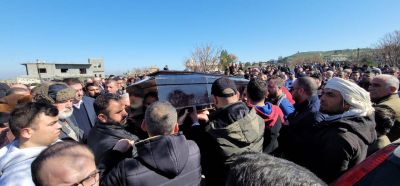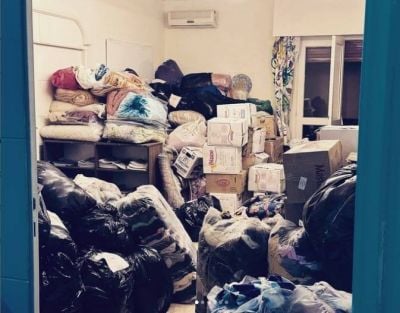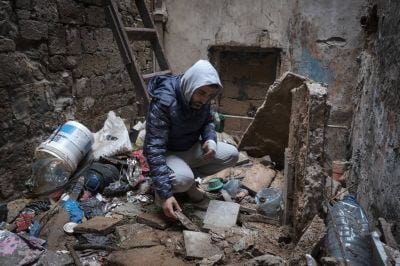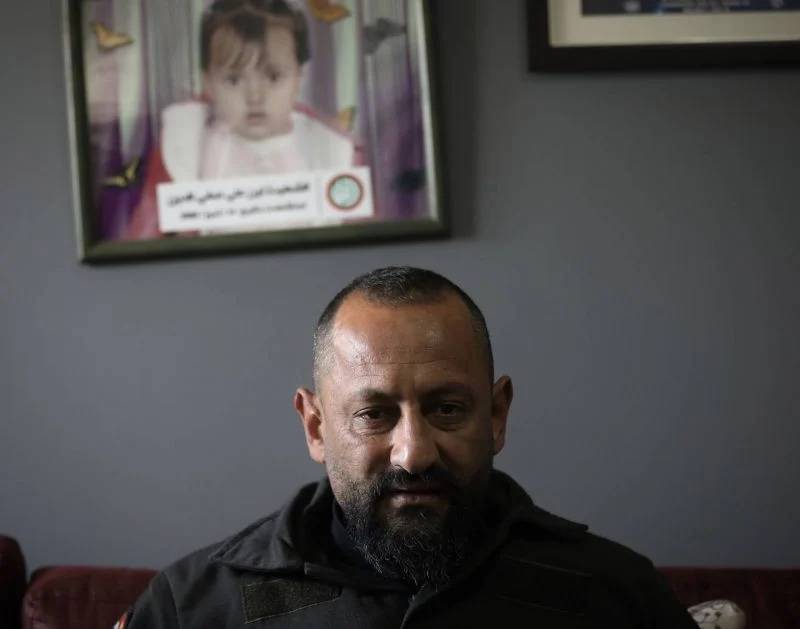
Ali Safieddine sits in his office in Sour on Feb. 14, 2023, under a portrait of his daughter Lynn, who was killed aged one year and six months during the July 2006 war. (Credit: Matthieu Karam/L'Orient-Le Jour)
In just a few days, Ali Safieddine has become the Lebanese hero of earthquake rescue operations in Syria.
In a video that circulated on social media days after the quake, he is seen on the site of the damage in the Syrian coastal town of Jableh. Some 122 hours later, Safieddine and his team saved a mother and her son from under the rubble.
“I can’t say anything after this scene. I pulled my daughter out in pieces during the 2006 war. I rescued a Syrian woman from under the rubble 15 hours after the port explosion,” he says with a deep voice, facing the camera.
In his office back home in Sour, where he is the head of the city’s Civil Defense, Safieddine is on edge. His hands unearthed one body after another from under the rubble. “We never come out of this kind of mission unscathed,” he tells L’Orient-Le Jour.
When he returned home, he was still wearing his uniform, which he calls “a symbol of honor.” Words rarely fail him. But when his phone rings, his throat closes up. He can no longer speak and tries to hold back his tears.
It is the first time he has heard the voice of Um Ibrahim since he rescued her a few days ago. The six floors and roof of the building she was in at the time of the quake had collapsed on her, her son and daughter.
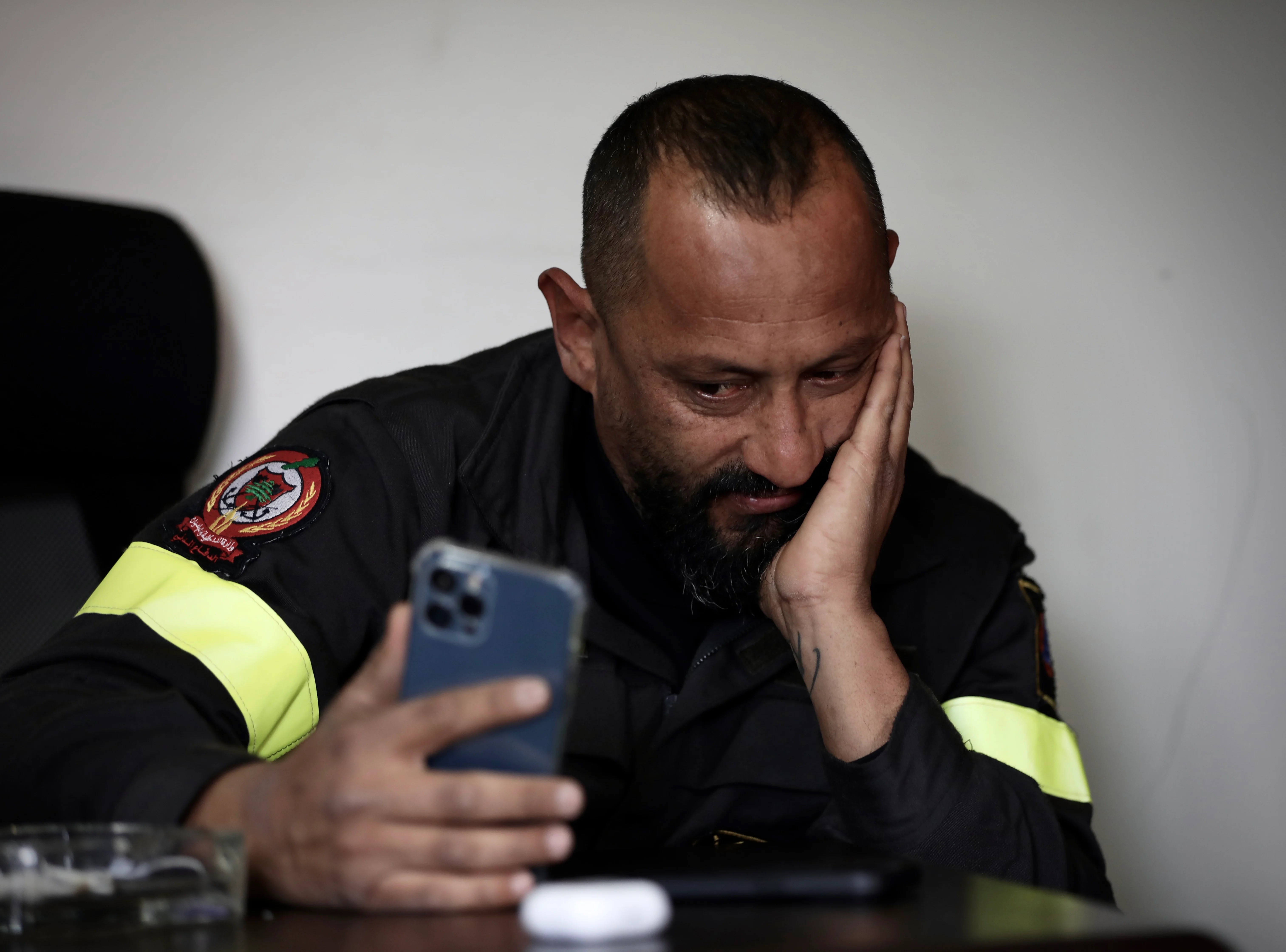 Ali Safieddine in tears, during a video call with Ibrahim, a young Syrian who the Lebanese rescuer saved in Jableh, Syria, following the deadly earthquake. Feb. 14, 2023. (Credit: Matthieu Karam/L'Orient-Le Jour)
Ali Safieddine in tears, during a video call with Ibrahim, a young Syrian who the Lebanese rescuer saved in Jableh, Syria, following the deadly earthquake. Feb. 14, 2023. (Credit: Matthieu Karam/L'Orient-Le Jour)
“You’re just like my mother,” he eventually says. He and his team have stayed in touch with “this family of angels,” after they returned.
“I knew I was going to get out of the rubble... It’s as if I was born again,” says Ibrahim, 23.
“You are like my son. I see my daughter Lynn in you,” Safieddine replies. Behind him is a photo of his daughter Lynn’s angelic face, a victim of Israeli bombings in 2006.
‘I wanted to see them one last time’
Safieddine is 40 years old. He looks a decade older. “I died in 2006,” he says over and over again. Along with the Civil Defense teams, he put out the fires and worked to pull out the bodies buried under the rubble during the Israeli war against Lebanon. He had joined the Civil Defense at the age of just 17.
After getting injured several times during the war, he decided to bring Lynn, 20 months old, and his wife back to the Civil Defense center at the time. “[I wanted] to see them one last time in case I were to lose my life,” Safieddine remembers.
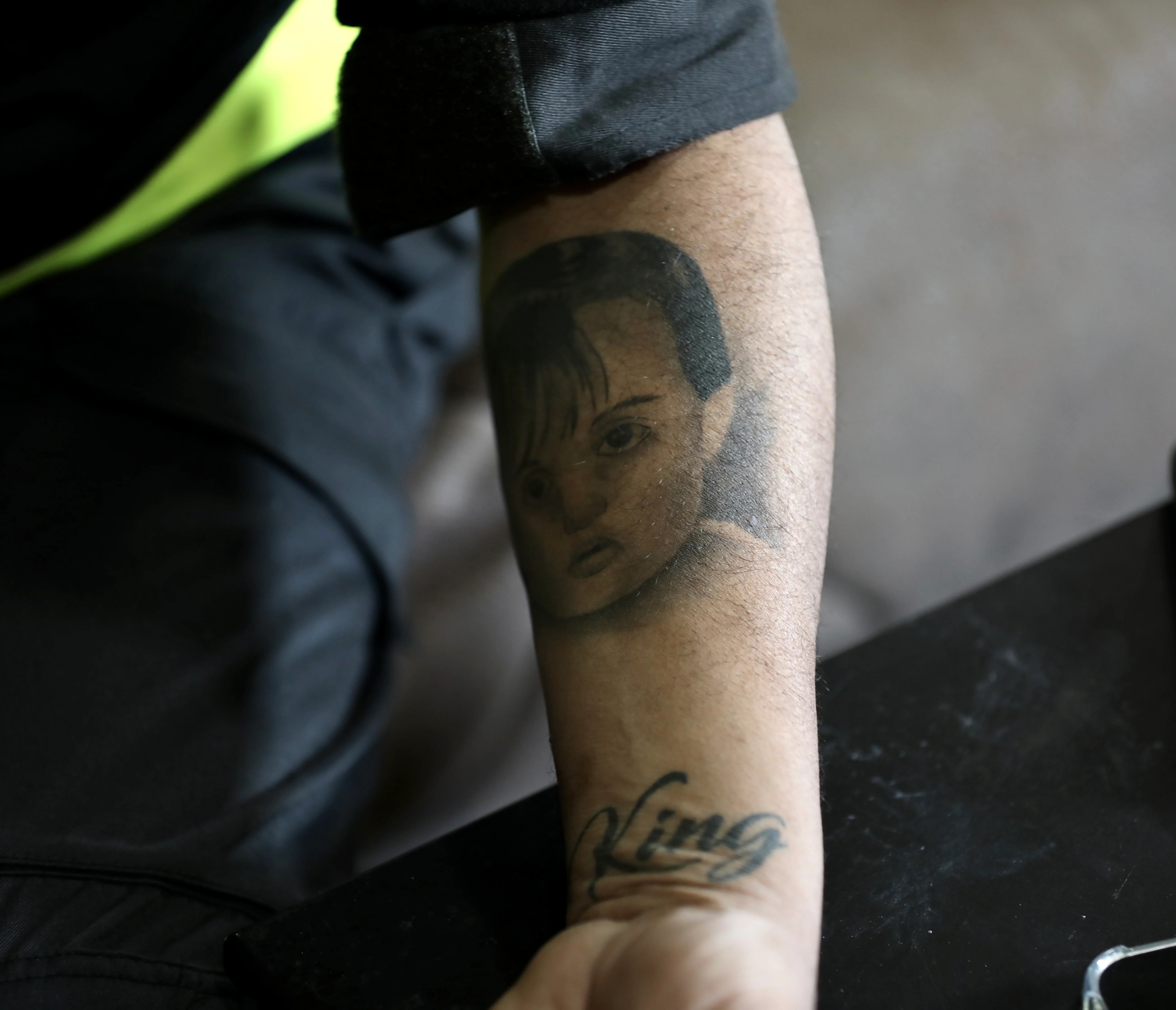 A portrait of Lynn, tattooed on the forearm of her father, Ali Safieddine, head of Civil Defense in Sour. Feb. 14, 2023. (Credit: Matthieu Karam/L'Orient-Le Jour)
A portrait of Lynn, tattooed on the forearm of her father, Ali Safieddine, head of Civil Defense in Sour. Feb. 14, 2023. (Credit: Matthieu Karam/L'Orient-Le Jour)
On July 16, two Israeli strikes hit the residential building where the center is located. He ran towards them. He took Lynn out, wounded from head to toe. Then he and his wife took her to a hospital in Saida. Once there, he learned that it was too late to save his daughter.
“He is particularly affected by what happens to children,” says Maroun, a colleague who has known Safieddine since 2000.
When he was younger, Safieddine watched the Civil Defense volunteers from his village enter buildings that had been set on fire. The stories of former director Mounir Daoud, whose portrait is displayed in the center and who died on a mission in 1993, kept his dream alive.
“He died as a martyr, everyone spoke of his sense of duty,” Safieddine says.
Originally from Shamaa, Safieddine grew up in Sour and joined the Amal movement’s al-Rissala al-Islamiya Scouts group. A portrait of his daughter Lynn with the Amal logo hangs on one of his walls. “It was a gift. I’m not politicized, my identity is the cedar of Lebanon, and my uniform is that of the Civil Defense.”
The life of this father of two centers around the Civil Defense. “He hardly sleeps or eats. I see my husband for maybe 30 minutes in 24 hours... At the time of the port blast, he returned [home] three months later,” says Nana, his wife of 21 years.
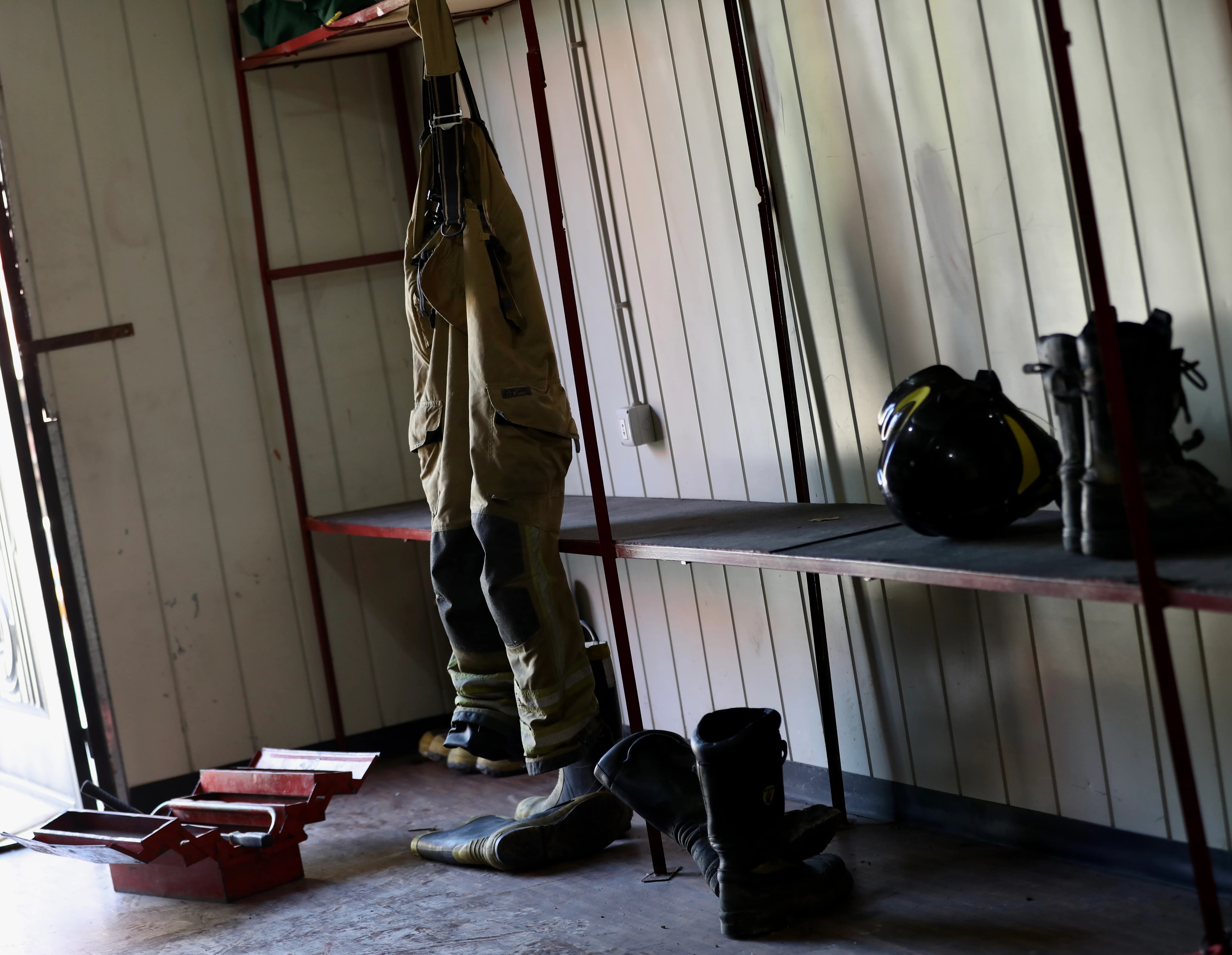 Equipment in a Civil Defense locker room in Sour, Feb. 14, 2023. (Credit: Matthieu Karam/L'Orient-Le Jour)
Equipment in a Civil Defense locker room in Sour, Feb. 14, 2023. (Credit: Matthieu Karam/L'Orient-Le Jour)
Along with his team, Safieddine was dispatched to rescue the survivors of the Aug. 4 explosion from beneath the rubble of Beirut.
More than 10 hours after the explosion, he pulled a young Syrian girl, Rama, 14 years old, from underneath the debris. “Lynn would have been of the same age. When I saved Rama, it was like God gave me back my daughter,” he says. This disaster “prepared” him to help the victims of the Feb. 6 earthquake.
In Jableh, with the regime’s authorization
On Feb. 7, the day after the quake, Safieddine was dispatched to Jableh, coastal Syria, along with 19 other colleagues in the Civil Defense, Beirut Fire Brigade, Lebanese Red Cross and the army. Little more than two hours’ drive away, Syria’s Idlib governorate, which is among the last strongholds controlled by the opposition, has been left largely alone.
“I don't want to talk about that, I had the impression on the site that everyone was receiving aid without discrimination. I am in the humanitarian, not the political field,” says Safieddine, shying away from questions about Syrian President Bashar al-Assad’s regime.
Arriving in Jableh, the Lebanese team was overwhelmed. The city was in ruins. The aftershocks still shook the ground and there was a strong smell of blood. In the first moments, Safieddine came across the body of a dead boy clinging to his mother’s hair. “At that moment, your heart fails, but after that, God gives you strength,” he says.
Their mission was to scan the area, search for bodies and rescue survivors with limited means. “We only had our hands and our ears,” said Safieddine.
In the freezing cold, the team worked hard, barely sleeping and eating. The first few days, they only pulled dead bodies out of the ruins. “I couldn’t stand by the families’ sides... It was too hard for me, I know how people feel at that moment.”
The team was sent to another building. The rescuers called out loud, in the hope of hearing a reply, but nothing. Three dozen bodies were pulled out of this building. But a man who still had not lost hope told them that his nephew was still alive. Under the rubble, the young man’s head was still moving after spending 122 hours under the rubble. His mother was still alive, but his sister died 30 minutes after the quake. “It was a miracle,” Safieddine says.
Safieddine’s teammates look at him with admiration. “He gave us strength... It was because of him that we saved the two survivors,” said Mohammad Halabi.
Team member Sobhi Siklawi , who also went to Jableh to help with relief efforts, says he is always confident when Safieddine is leading a mission. “We know he will handle the situation well,” he says.
On the ground in Syria, Safieddine kept his cool. He had to be calm. But once back in Lebanon, “everything came to the surface, everything overflew.” In the Civil Defense center, they recalled the “horrors” they saw. “Khalas, let’s stop talking about that, we must forget,” says Safieddine.
On Wednesday last week, Safieddine once again traveled, this time to Bulgaria. He heard about a Lebanese migrant who died “from cold” and was abandoned by his smuggler.
He decided to go to the other side of the Mediterranean to help repatriate the body of the young man, he says. “I can’t imagine a child being buried away from his parents.”
This article was originally published in French in L’Orient-Le Jour. Translation by Joelle El Khoury.
